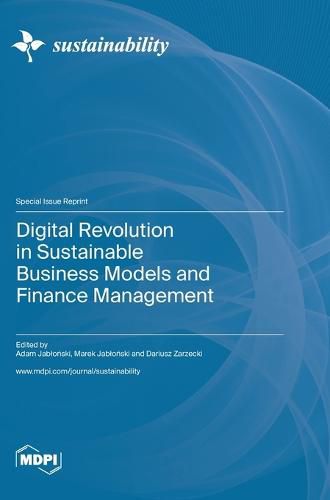Readings Newsletter
Become a Readings Member to make your shopping experience even easier.
Sign in or sign up for free!
You’re not far away from qualifying for FREE standard shipping within Australia
You’ve qualified for FREE standard shipping within Australia
The cart is loading…






This title is printed to order. This book may have been self-published. If so, we cannot guarantee the quality of the content. In the main most books will have gone through the editing process however some may not. We therefore suggest that you be aware of this before ordering this book. If in doubt check either the author or publisher’s details as we are unable to accept any returns unless they are faulty. Please contact us if you have any questions.
At present, the digital economy is creating a new approach to sustainable development. In particular, this relates to the transformation of the traditional economy via the influence of digitalization on finance management processes. The digital economy is affecting changes in resource management processes. Dynamic digital transformation processes are currently taking place and exerting influence on the shaping of new business models. Existing business models are changing, particularly in the context of their life cycle. The new economic model is rendered social factors more important in terms of creating value for people and the natural environment. Trust in financial institutions, which is also a factor in sustainable business models, is an important criterion for business research. Economic model based on the irresponsible use of natural resources have been heavily criticized for years, and societies have begun to reject business models that negatively impact the environment. The aim of this Special Issue is to present the results of research on the current trends and challenges related to the digital revolution in financial management for sustainable development, an issue that requires extensive research and analysis.
$9.00 standard shipping within Australia
FREE standard shipping within Australia for orders over $100.00
Express & International shipping calculated at checkout
This title is printed to order. This book may have been self-published. If so, we cannot guarantee the quality of the content. In the main most books will have gone through the editing process however some may not. We therefore suggest that you be aware of this before ordering this book. If in doubt check either the author or publisher’s details as we are unable to accept any returns unless they are faulty. Please contact us if you have any questions.
At present, the digital economy is creating a new approach to sustainable development. In particular, this relates to the transformation of the traditional economy via the influence of digitalization on finance management processes. The digital economy is affecting changes in resource management processes. Dynamic digital transformation processes are currently taking place and exerting influence on the shaping of new business models. Existing business models are changing, particularly in the context of their life cycle. The new economic model is rendered social factors more important in terms of creating value for people and the natural environment. Trust in financial institutions, which is also a factor in sustainable business models, is an important criterion for business research. Economic model based on the irresponsible use of natural resources have been heavily criticized for years, and societies have begun to reject business models that negatively impact the environment. The aim of this Special Issue is to present the results of research on the current trends and challenges related to the digital revolution in financial management for sustainable development, an issue that requires extensive research and analysis.